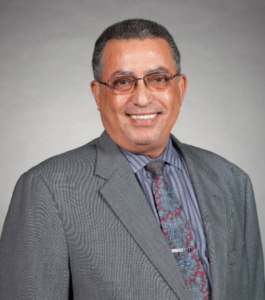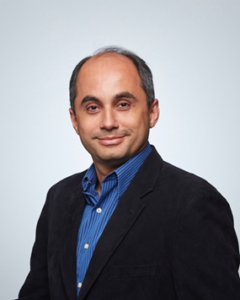Cybersecurity in Power Electronics
Session A & B
Organizers: Osama Mohammad, Burak Ozpineci
Abstract:
The IEEE Workshop of Cybersecurity of Power Electronic Systems (CyberPELS) provides a common forum and networking platform for industry experts, researchers, and academia to share technology updates, research findings, lessons learned, and best practices in the areas of cyber-secure power electronic systems. This special session is a part of the 1-day CyberPELS Workshop being held before ECCE and will comprised of a mix of industry and academic leaders describing the latest advances in various aspects of cybersecurity for power electronic systems.
Short Bios of Organizers:
 Osama A. Mohammed (Fellow, IEEE) received the master’s and doctoral degrees in electrical engineering from Virginia Tech, Blacksburg, VA, USA, in 1981 and 1983, respectively. He is currently a Distinguished Professor of and Associate Dean of Research at the College of Engineering, Florida International University (FIU), Miami, FL, USA. He is also the Director of the Energy Systems Research Laboratory, FIU and a Professor of electrical and computer engineering.
Osama A. Mohammed (Fellow, IEEE) received the master’s and doctoral degrees in electrical engineering from Virginia Tech, Blacksburg, VA, USA, in 1981 and 1983, respectively. He is currently a Distinguished Professor of and Associate Dean of Research at the College of Engineering, Florida International University (FIU), Miami, FL, USA. He is also the Director of the Energy Systems Research Laboratory, FIU and a Professor of electrical and computer engineering.
Dr. Mohammed is a world-renowned expert on various topics in power and energy systems, including design optimization and physics-based modeling in electric machines and drives, energy storage systems, and power electronics. He currently has active research projects for several federal agencies in these areas. Additionally he has research interests in smart-grid distributed control, interoperability, and energy cyber-physical systems. His presentations are frequently invited at academic and industrial organizations and conferences worldwide. He has authored/coauthored more than 750 articles in refereed journals and international conferences and holds 16 patents awarded or filed. He has also authored a book and several book chapters.
Dr. Mohammed is also an elected Fellow of the Applied Computational Electromagnetic Society ACES. He is a recipient of the prestigious IEEE Power and Energy Society Cyril Veinott Electromechanical Energy Conversion Award and the 2012 Outstanding Research Award from FIU, the 2017 Outstanding Doctoral Mentor, and the Distinguished Professor designation in 2018.
 Burak Ozpineci (Fellow, IEEE) received the B.S. degree in electrical engineering from Orta Dogu Technical University, Ankara, Turkey, in 1994, and the M.S. and Ph.D. degrees in electrical engineering from The University of Tennessee, Knoxville, TN, USA, in 1998 and 2002, respectively. He joined the Post-Master’s Program with Power Electronics and Electric Machinery (PEEM) Group, Oak Ridge National Laboratory (ORNL), Knoxville, TN, USA, in 2001, and was a Full Time Research and Development Staff Member in 2002 and the Group Leader of the Power and Energy Systems Group in 2008. He is currently leading the Power Electronics and Electric Machinery Group and managing the Electric Drive Technologies Program at ORNL. He also serves as a Joint Faculty with Bredesen Center at The University of Tennessee.
Burak Ozpineci (Fellow, IEEE) received the B.S. degree in electrical engineering from Orta Dogu Technical University, Ankara, Turkey, in 1994, and the M.S. and Ph.D. degrees in electrical engineering from The University of Tennessee, Knoxville, TN, USA, in 1998 and 2002, respectively. He joined the Post-Master’s Program with Power Electronics and Electric Machinery (PEEM) Group, Oak Ridge National Laboratory (ORNL), Knoxville, TN, USA, in 2001, and was a Full Time Research and Development Staff Member in 2002 and the Group Leader of the Power and Energy Systems Group in 2008. He is currently leading the Power Electronics and Electric Machinery Group and managing the Electric Drive Technologies Program at ORNL. He also serves as a Joint Faculty with Bredesen Center at The University of Tennessee.
Speakers and presentations:
- Jeremiah Miller, US Department of Energy
System Control & Cybersecurity Challenges for High Penetration Solar Grids
- Lynn Petersen, Office of Naval Research
Wide Bandgap and Ultra Wide Bandgap Power Switching Devices for Secure High Frequency, High Voltage and Power Dense Applications
- Frede Blaabjerg, Aalborg University
Security Framework for Power Electronic Systems
- Prasad Enjeti, Texas A&M University
An Active Defense Framework Through Dynamic Watermarking in Power Electronically-Interfaced Distribution Grids
- Jinan Zhang, University of Georgia
A Comprehensive Assessment and Detection Methodology for Power Electronics Based Smart Grids (PESG) due to Cyber Attacks
- Subham Sahoo, Aalborg University
Resilient Operation of Cooperative Grid-Forming Converters Against Cyber Attacks
- Le Xie, Texas A&M University
An Active Detection Scheme for Cyber Attacks on Grid-tied PV Inverters
- Xiaonan Lu, Temple University
Resilient Distribution Systems Operation with Reconfigurable Cyber-Physical Networks Using Situation-aware Power Electronics